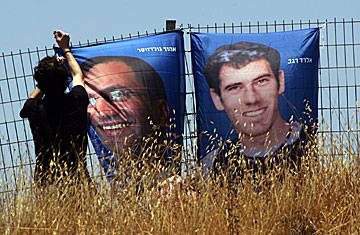
An Israeli hangs posters of the two Israeli soldiers believed to be held by Hezbollah in Lebanon, during a demonstration outside Prime Minister Ehud Olmert's office on June 29 in Jerusalem.
In July 2006, commandos from the Lebanese militia Hizballah stole into northern Israel and, during a firefight, kidnapped two soldiers — Eldad Regev and Ehud Goldwasser. Their capture triggered a month-long war in which 159 Israelis and 1,109 Lebanese were killed. But the fate of the two soldiers remained unclear.
Were they alive? No proof of life was ever given by Hizballah. And a medical report carried out a week after the ambush stated that in all likelihood, the two soldiers probably died of wounds soon after they were captured. Even with that grim knowledge, Israeli pressed ahead with the war, in a fruitless attempt to crush the Lebanese militia. When the war ended, Israel began in earnest to seek Regev and Goldwasser's return, even if that meant collecting two coffins.
On Sunday, the Israeli cabinet shrugged off warnings by its own top military and intelligence advisers and voted by a large majority to carry out a prisoner exchange with Hizballah. Reliable military sources told TIME that in exchange for Regev and Goldwasser, Israel agreed to hand over 15 Lebanese prisoners — including 10 Hizballah fighters killed during the 2006 war, four jailed Hizballah members and one Lebanese-Druze murderer serving a life sentence in Israel. The deal was brokered by a senior German diplomat with experience in similar prisoner exchanges, sources say. Prime Minister Ehud Olmert also confirmed on Sunday for the first time that the kidnapped soldiers had indeed been killed, but failed to inform the soldiers' long-grieving relatives before going public with the news — a "gaffe," as one of the soldiers' family members described Olmert's negligence.
Israeli officials say that the prisoner exchange could happen "within a week to 10 days," probably via Germany, which is acting as an intermediary between Israel and its sworn enemy Hizballah.
Olmert and his cabinet overrode advice from the chiefs of Mossad and the Shin Bet, Israel's foreign and domestic intelligence agencies, not to release live — and potentially dangerous — prisoners. But Israel has always placed a premium on securing the remains of its soldiers fallen in foreign battles. And calls for a prisoner swap have turned into a charged and emotive public issue in Israel — with general elections just around the corner, few cabinet ministers were willing to go against the popular tide. As Transport Minister Shaul Mofaz, who is in favor of a prisoner swap, said today: "We have an opportunity to put an end to this sad, painful story.... If Israel does not look out for its sons, its sons will not look out for it."
Still, many Israelis objected to deal — in particular, to the release of the Lebanese murderer, Samir Kuntar, who is currently serving a life sentence for breaking into the home of an Israeli family in 1979 and killing the family's father and one of his daughters. As Kuntar searched the house for more victims that night, the mother, Smadar Haran, hid with her baby daughter, holding a hand over the toddler's mouth to stifle her screams. Kuntar never found the pair, but when Haran finally removed her hand from her daughter's face, she realized, with horror, that she had unwittingly suffocated the girl. While the public argued against Kuntar's return to Lebanon, the widow Haran issued a statement supporting the prisoner exchange: "This terrible murderer is not, and never was, my private prisoner," she wrote. "I ask that my personal pain will not interfere with your dilemma and your decision regarding the prisoner exchange deal."
The families of Regev and Goldwasser also kept up a steady campaign in Israel and abroad, pressing Olmert for action on the return of the two soldiers. On Sunday, after the cabinet announced that it would exchange prisoners with Hizballah, Olmert met personally with the Regev and Goldwasser families, who expressed their approval of the cabinet decision and said they expected a swift conclusion to the deal. Israeli leaders are hoping to oblige the families, but the timing is now up to Hizballah chief Hassan Nasrallah, who may drag the process out for weeks, or even months, say Israelis. Olmert and the cabinet, however, have achieved their primary goal: catering to the public opinion ahead of the election. —With reporting by Aaron J. Klein/Jerusalem
